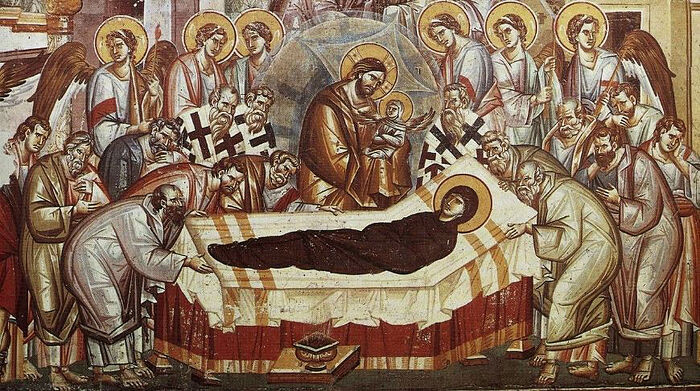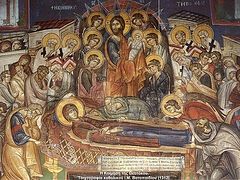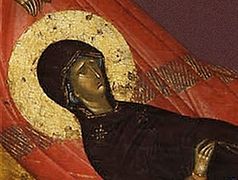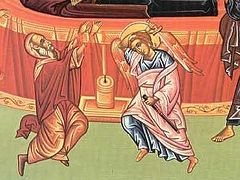Philippians 2:5-11; Luke 10:38-42; 11:27-28
There is nothing more fundamental to our faith as Orthodox Christians than the good news that Jesus Christ is risen from the dead. Our Lord entered fully into our world of brokenness and pain and was as dead and buried as anyone else lying in the grave; but since He is God, Hades and the tomb could not contain Him. Because He is risen, those who die enter into His presence as they await the resurrection of the body and the Last Judgment. Those who have embraced Him experience paradise as a foretaste of heaven, for they are with the Lord in Whose life they shared by faith, hope, and love. Our Savior rose as a whole person with a glorified body and then ascended into heaven forty days later. He has opened the doors to the eternal joy of the heavenly kingdom to us all.
As St. Paul wrote in today’s epistle lesson, Christ rose and ascended because, while being fully divine, He “emptied Himself, taking the form of a servant, being born in the likeness of men. And being found in human form, He humbled Himself and became obedient unto death, even death on a cross. Therefore, God has highly exalted Him and bestowed on Him the Name which is above every name, that at the Name of Jesus every knee should bow, in heaven and on earth and under the earth, and every tongue confess that Jesus Christ is Lord, to the glory of God the Father.” By becoming fully one of us in a world enslaved to the fear of death, He has made it possible for us to become participants in His heavenly glory.
Today we celebrate the great feast of the Dormition of the Most Holy Theotokos, a feast which manifests how we may all share in the Lord’s victory over the corrupting powers of sin and death. At the end of the Mother of God’s earthly life, the Apostles were miraculously assembled in her presence. St. Thomas, however, arrived three days late. When her tomb was opened for him to pay his last respects, her body was not there. Even as she was the first to accept Christ into her life—and even into her womb as His virgin mother—she was the first to follow Him as a whole, complete person into the Kingdom of Heaven. Her Dormition is an icon of our hope for eternal life as “partakers of the divine nature” by grace.
In order to celebrate this feast properly, we must remember that the Virgin Mary is as fully human as the rest of us. We call her “Theotokos” because she is the “Bearer” or “Mother of God.” The One to Whom she gave birth is our Lord, God, and Savior Jesus Christ. In order for Him to be truly human, He had to have a mother like the rest of us. From ancient times, Christians have honored her with this title for that very reason. The only ones who refused to call her Theotokos were those who did not believe in the divinity of the child born to her, such as the heretic Nestorius. In response to various abuses in the Roman Catholic Church during the Middle Ages, Protestant traditions have downplayed and often ignored her unique role in our salvation. In contrast, the Orthodox Church makes a clear distinction between worship and honor or veneration. We worship only God, but we honor or venerate those whose lives are shining examples of God’s holiness. The honor that we give them magnifies the glory of God, Who has done great things through them. Properly honoring the Theotokos in no way distracts us from worshiping her Son, but inspires us all the more to welcome Him into our lives as she did. And since she followed Him into the heavenly kingdom at her Dormition, how could we not ask for her prayers even as we celebrate her paradigmatic example of loving and serving the Lord? He turned water into wine at the wedding feast in Cana of Galilee, His first miraculous sign in St. John’s gospel, at His mother’s request.
When we pray, “Most Holy Theotokos, save us!,” we ask for her to intercede with her Son with motherly boldness as the one most closely united to Him in holiness and love. She is obviously not herself the Savior and is not by nature divine, but became radiant with the divine glory by being fully receptive and obedient to the Lord, even to the point of becoming His living temple when she freely chose to become His virgin mother. St. James wrote that “he who turns a sinner from the error of his way will save a soul from death and cover a multitude of sins.” (Jas. 5:20) We ask for her prayers to do precisely that for us, our loved ones, and our world. As the one whose free consent played a crucial role in the coming of Christ, her intercessions continue to help us personally embrace the healing mercy of her Son.
Today’s gospel reading reminds us that the Theotokos entered into eternal life because she attended to the one thing needful: hearing and obeying the word of the Lord. As she said to the Archangel Gabriel, “Behold the handmaid of the Lord; let it be to me according to your word.” Through her humble obedience, she gave life to the One Who conquers death. She put her life and her reputation at risk as a result. The idea of a virginal conception was simply unbelievable and she surely knew what some people thought and said about her. The Theotokos saw her Son rejected, condemned, tortured, and publicly executed as a traitor and a blasphemer. Nonetheless, she did not abandon Him, but was the first to hear the good news from an angel of His resurrection.
The Theotokos shows us that the healing of our souls does not come through getting our own way, having an easily life in conventional terms, and being associated with a group or nation that gains earthly power. No, she is a living icon of what happens when we refuse to be distracted by whatever temptations, fears, and other distractions would keep us from saying “Yes!” to God. In our world of corruption, following her example will require suffering, not as a punishment, but due to the inevitable tension we experience in reorienting our lives from self-centeredness to God-centeredness in light of our own personal brokenness. Instead of recognizing that tension for what it is and mindfully calling for the Lord’s help in resisting temptation, we so often distract ourselves from confronting the painful truth with food, drink, mindless entertainment, condemning and blaming others, obsessively trying to achieve perfection in any area of life, and gratifying our addictions, whatever they may be.
Like the Theotokos, we must refuse to indulge in such distractions and instead accept the truth about what it will mean to live a life pleasing to God. She surely suffered in doing so in ways that we cannot imagine, for she saw her only Son and God slandered, rejected, abused, and slaughtered. The words of the Psalmist may well have been hers: “I am weary with my groaning; shall I weep every night upon my bed and drench my couch with tears? My eye is troubled with my grief. I am worn out because of all my enemies.” (Ps. 6) “How long, O Lord, will you forget me? Forever? How long will you turn your face away from me? How long shall I take counsel in my soul and have grief in my heart, day and night? How long shall my enemy be exalted over me?” (Ps. 12)
Like the Theotokos, the Psalmist does not embrace despair, but hopeful trust in God: “Depart from me all you who work iniquity, for the Lord has heard the voice of my weeping. The Lord heard my petition, the Lord has accepted my prayer. Let all my enemies be ashamed and troubled; let them turn back and be greatly ashamed instantly.” (Ps. 6) “Those who trouble me would rejoice if I were to totter; but I have placed my trust in your mercy. My heart shall rejoice in your salvation; I shall sing to the Lord who has done me so much good, and I shall sing psalms to the name of the Lord most high.” (Ps. 12) The Theotokos was one of the Myrrh-Bearing Women who went early in the morning to anoint the Lord’s dead body. With grieving hearts, they went to show Christ one last act of love. And that is when she received news as unbelievable as a virginal conception, for her Son had risen victoriously over death.
If we want to follow the Theotokos as participants in the eternal life of her Son and Lord, then we must embrace the struggle for the healing of our souls with all the suffering that that will entail. Many of our hearts are surely broken today by the weight of our own sins and our worries and fears for the wellbeing of our loved ones and of our world. Instead of distracting ourselves by whatever means from facing squarely our brokenness and pain, we must do what we exclaim so many times throughout our services: “Calling to remembrance our all holy, immaculate, most blessed and glorious Lady Theotokos and ever-virgin Mary, with all the Saints, let us commend ourselves, and each other, and all our life unto Christ our God.” That is the one thing needful for us all, and we must refuse with every ounce of our being the temptation to ground the meaning and purpose of our lives anywhere else. Let us take the Theotokos as our great example of how to receive and follow Christ every day, even as we ask for her prayers for the healing of our souls. That is the only way to celebrate the great feast of her Dormition with spiritual integrity.




